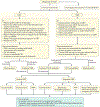Obsessive-compulsive disorder
- PMID: 31371720
- PMCID: PMC7370844
- DOI: 10.1038/s41572-019-0102-3
Obsessive-compulsive disorder
Erratum in
-
Author Correction: Obsessive-compulsive disorder.Nat Rev Dis Primers. 2024 Oct 16;10(1):79. doi: 10.1038/s41572-024-00569-z. Nat Rev Dis Primers. 2024. PMID: 39414819 No abstract available.
Abstract
Obsessive-compulsive disorder (OCD) is a highly prevalent and chronic condition that is associated with substantial global disability. OCD is the key example of the 'obsessive-compulsive and related disorders', a group of conditions which are now classified together in the Diagnostic and Statistical Manual of Mental Disorders, Fifth Edition, and the International Classification of Diseases, 11th Revision, and which are often underdiagnosed and undertreated. In addition, OCD is an important example of a neuropsychiatric disorder in which rigorous research on phenomenology, psychobiology, pharmacotherapy and psychotherapy has contributed to better recognition, assessment and outcomes. Although OCD is a relatively homogenous disorder with similar symptom dimensions globally, individualized assessment of symptoms, the degree of insight, and the extent of comorbidity is needed. Several neurobiological mechanisms underlying OCD have been identified, including specific brain circuits that underpin OCD. In addition, laboratory models have demonstrated how cellular and molecular dysfunction underpins repetitive stereotyped behaviours, and the genetic architecture of OCD is increasingly understood. Effective treatments for OCD include serotonin reuptake inhibitors and cognitive-behavioural therapy, and neurosurgery for those with intractable symptoms. Integration of global mental health and translational neuroscience approaches could further advance knowledge on OCD and improve clinical outcomes.
Conflict of interest statement
Competing interests
Figures







References
-
- Robbins TW, Vaghi MM & Banca P Obsessive-compulsive disorder: puzzles and prospects. Neuron 102, 27–47 (2019). - PubMed
-
- Mataix-Cols D, do Rosario-Campos MC & Leckman JFA Multidimensional model of obsessive-compulsive disorder. Am. J. Psychiatry 162, 228–238 (2005). - PubMed
-
- Taylor S et al. Musical obsessions: a comprehensive review of neglected clinical phenomena. J. Anxiety Disord 28, 580–589 (2014). - PubMed
-
- Stein DJ, Hollander E & Josephson SC Serotonin reuptake blockers for the treatment of obsessional jealousy. J. Clin. Psychiatry 55, 30–33 (1994). - PubMed
Publication types
MeSH terms
Grants and funding
LinkOut - more resources
Full Text Sources
Other Literature Sources
Medical

